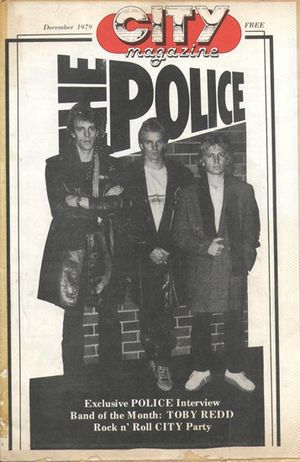1979-12 City Magazine
| City Magazine | |
|---|---|
| Article title: | The Police |
| Artist or band featured: | The Police |
| Year: | 1979 |
| Month: | December |
| Country (or countries) of publication: | USA |
| Language(s): | English |
| Author/interviewer: | Jackie Stinchcombe |
| Length of feature: | 2 pages + cover |
In December 1979, The Police were featured in City Magazine.
Summary
The magazine features an interview with The Police that took place in Detroit after their concert on 1979-11-10 - shown here with permission from the interviewer:
POLICE is one of the most unusual and original acts of the year. They managed to prove to record companies many things that in the past were unheard of for debut rock bands and their albums. With their third tour of the States, they have managed to pack clubs and small concert halls, and the critics have raved. Their debut album on A&M "Outlandos d'Amour" rode to the top of the chart, which was produced, written , and performed by the band. Their second tour brought about a lot of fresh and new ideas to the media and could lead to the opening of new doors to a form of rock'n'roll styled by the POLICE. After a recent concert at "Bookie's" CITY MAGAZINE had a chance to talk to guitarist Andy Summers, drummer Stewart Copeland and bass player and songwriter Sting.
CITY: Why is the band named Police?
ANDY: It's a very strong name. It has a certain amount of irony, which appeals to us. It's anti-establishment and it's a strong symbol of power. Nobody asks twice, you don't have to gild the lily. It lets people attach their own personal image to the name.
CITY: Who's idea was the name?
ANDY: Stewart's. It was a good name because the group started at the beginning of the punk thing in London in 1976, and it seemed appropriate.
CITY: Why is Sting called "Sting"?
ANDY: "Because he's an asshole."
STING: The name is very official because my mother calls me Sting ... I've had the name for about 7 years. I got it when I used to play in a Dixieland Jazz group and I used to wear this jumper that was black and yellow. I looked like a wasp and they called me Sting and it stuck.
CITY: Why did you write a story about Ladies of the Night as in "Roxanne"?
STING: I was fascinated by the subject. I've never seen them on the street until Paris and I was just fascinated.
ANDY: We were staying in a hotel that was surrounded by these people and it was a colorful situation that led to a colorful song.
CITY: Did you pick it as a first release?
ANDY: Well, actually our manager picked it for us.
CITY: Why did you produce your own album?
ANDY: Nobody else would do it!
STING: Because we're great producers!
ANDY: We wanted to run our careers, so we produced our own album, we wanted to be different.
CITY: Were there any negative comments on the production of the album?
ANDY: Early on there were some, but after we mixed a couple of songs and non one else could do it better, they left us up to our own devices.
CITY: Why was your production so successful?
ANDY: We've all been in the studio before,, so we knew what we wanted and with only a three piece group, a lot of problems are already solved.
CITY: What about reggae influences?
ANDY: There's nothing like reggae in the album (laughs).
STING: There wasn't a conscious attempt to play reggae, though there is some influence.
CITY: What do you feel projects that image?
ANDY: We put the bass and drums in a different, unusual place compared to traditional rock & roll. Reggae-ish.
CITY: How would you label your music?
ANDY: (Thinks for a moment) - "ROCKAE!"
CITY: What do you feel are the strong points of the band?
ANDY: Sting's voice is original and very identifiable. We avoid cliches, improvise a lot, play free and try to be different.
CITY: What about weak points?
ANDY: The only weakness could be in songwriting. But with strong, fresh songs and avoiding cliches we won't have any problems.
CITY: Do you experiment?
ANDY: Yeah, it happens all the time ... lots of new things happen because of the spontaneous playing. Every night is a potential source of new ideas.
CITY: Who would you say are your influences?
STEWART: "Andy's my favorite." Actually, it changes all the time, but reggae would be the most obvious even though we don't conscientiously try to play reggae.
ANDY: I love Brian Eno! Eno is a definite influence on me. Also rhythm & blues.
STEWART: Chopin's first album.
CITY: What are the differences between European and American audiences?
ANDY: In England the people go berserk, they are very reactionary. In America they get into subtleties more, they tune into the band. English audiences just automatically go crazy.
Quotes and noteworthy content
External links
This section needs more information.
References
This section needs more information.


